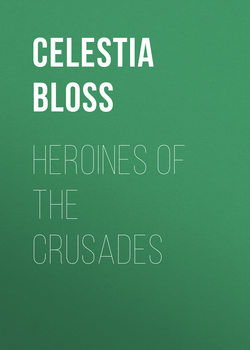Читать книгу Heroines of the Crusades - Celestia Angenette Bloss - Страница 2
ADELA
CHAPTER I.
THE NIGHT OF THE 20TH OF MARCH, 1067
Оглавление“Wave high your torches on each crag and cliff
Let many lights blaze on our battlements,
Shout to them in the pauses of the storm
And tell them there is no hope.”
Maturin’s Bertram.
All night long the Lady Matilda, with her becoming children, knelt before the holy shrine in the old Abbey of Feschamp.
Anxiously had they watched through the lingering twilight, for the whitening sails of the Conqueror’s fleet. No sails appeared, and the night fell dark and stormy upon the English channel. Meet was it that prayer should ascend to Him who rules the destiny of nations, for the hopes of all future times were rocked upon that midnight sea. The field of Hastings was won, Harold was slain, England was subdued, and the ships of William the Conqueror, filled with the flower of Norman chivalry, and followed by the sad remnant of Saxon nobles, were speeding to the Norman coast.
Was it Woden the storm-throned, that thus with relentless fury pursued the Viking’s progeny, – despoilers of the Saxon race? Was it Thor the thunder-voiced, warning the proud Conqueror that the great heart of England still throbbed with the pulse of Freedom, though the vale of Sanguelac was red with the blood of her bravest sons? Was it the spirit of a milder Faith that prevailed over that night of darkness, spread a calm morning on those troubled waters, and through that all-pervading sunlight scattered blessings countless as the liquid jewels that paved the track of the rescued ships?
The Mora with its splendid convoy was in sight, the bells rang out merrily their matin chimes, and while Matilda lingered to unite in the anthem of thanksgiving and praise, the little Adela, escaping from the care of the attendants, found her way through the dim aisles, to the door of the church, where she stood the radiant picture of delight, gazing with childish interest upon the scene before her.
The solemn service over, Matilda with her stately train emerged from the Abbey and encircled by a princely retinue of knights and ladies, watched the swelling canvass, which under the pressure of a steady breeze, bore the gallant vessels into port. Impatient of delay, the royal children ran eagerly down the green slope to the water’s edge. “Now brothers mine,” said the fiery William, “the fair and goodly land of England, to him who in three stones’ cast shall twice strike yon fisherman’s buoy.” Seizing a pebble as he spoke, he was about to hurl it towards the destined mark, when Adela thoughtlessly grasped his arm. The stone dropped idly into the wave, sprinkling the short cloaks, and embroidered tunics of the little group. A derisive laugh followed this exploit, and Adela, familiar with the effects of William’s anger, fled from his uplifted hand to the protecting care of Richard, who, sheltering her with his arm, exclaimed, “Robert, imagine yon buoy a Saxon Earl, and try your prowess upon him. I resign all claim to the conquered realm.”
“Book and bell, latin prayers, and a pilgrimage for my brother Richard,” replied Robert, selecting a smooth pebble and preparing to throw, but, ere the stone left his hand, a well directed missile from William struck the buoy, and sank it for a moment beneath the waves. With a look of proud disdain Robert hurled the stone. It fell dimpling the waters far beyond the mark. “England is mine,” shouted William, as again with unerring aim he dashed the buoy beneath the surface. “England is mine,” he repeated, pointing exultingly to the Saxon banner grasped in the hand of his own effigy upon the prow of the Mora. Robert smiled contemptuously, and rejoined his mother.
All eyes were now directed towards the gallant bark which rode proudly into port, amid the joyous flutter of banners, gonfanons, pennons, and streamers which from every mast, spar, and standard, waved and flapped in the morning breeze.
A glad shout burst from the assembled multitude, and cries of “Long live the conqueror William! Long live our good Duke of Normandy!” echoed by the clangor of trumpet, and chiming of bells, welcomed the victor on shore. Fondly embracing his lovely wife and children, and graciously receiving the greeting of his rejoicing subjects, he turned to present the noble Saxons, that swelled the pomp of his train.
“My Matilda will welcome Edgar Atheling, in whose veins flows the blood of her sire Alfred the Great. The brave Earls Morcar and Edwin, the noble Waltheof, and his beautiful daughter Maude, are also guests at our court, and must lack no courtesy at our hands.”
While Matilda with high-born grace and dignity received her reluctant guests, the little Adela accustomed to the sight of mail-clad barons, and princely array, felt herself irresistibly attracted by the timid girl, who clung tremblingly to the arm of Earl Waltheof. Other eyes than hers were fascinated by the appearance of the lovely stranger. A yellow kirtle of the finest wool fell in graceful folds to her feet; over this was thrown a purple robe, which confined at the bodice by a girdle exquisitely wrought, draped without concealing the delicate proportions of a figure cast in nature’s finest mould. A crimson coverchief half hid the jewelled network, from which her fair brown hair, brightening to gold in the sunshine, escaped in rich abundance over a neck of snow. The steady light of her meek violet eyes fell lovingly on Adela, and the faint tinge upon her cheek deepened into a brilliant blush, as the sprightly child kindly taking her hand, led her forward to receive the kiss of welcome from the Queen Duchess Matilda.
